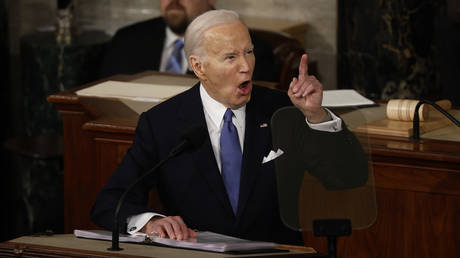ARTICLE AD BOX
THE US must inflict “severe violence” on Iran as quickly as possible or risk facing more attacks, a former British Army commander has warned.
Three American soldiers were killed in a drone attack in Jordan over the weekend, dramatically escalating the situation in the Middle East.
 Reuters
Reuters Former British Army commander Colonel Richard Kemp told The Sun the US must inflict ‘severe violence’ on Iran
Former British Army commander Colonel Richard Kemp told The Sun the US must inflict ‘severe violence’ on Iran
The trio was killed on Saturday night at a US outpost called Tower 22 in northeast Jordan, near the border with Syria.
It was the first time US troops had been killed by enemy fire in the Middle East since the beginning of the Gaza war.
US President Joe Biden said on Sunday that that while officials were still “gathering facts”, it was clear that the attack was “carried out by radical Iran-backed militant groups operating in Syria and Iraq”.
He vowed to hold those responsible to account “at a time and in a manner” of the US’ choosing.
Iran-backed umbrella group Islamic Resistance later accepted blame for the attack, as Iran‘s mission to the UN denied Tehran had any involvement.
Former British Army commander Colonel Richard Kemp told The Sun that there was only one possible response to the killing of three US service members: “severe violence against the Iranian regime”.
He said: “The attacks against US forces in Jordan are a major new escalation, because although there have been something like 160 attacks against US forces by Iranian proxies in the last two or three months, this is the first time that we’ve seen three Americans killed.
“The Americans must respond in a decisive way.”
“It’s not good enough just for the Americans to respond against Iranian proxies, now they must respond against Iran itself.”
Col Kemp explained that the US would have to launch a “significant” attack, not just a “tit for tat” response.
He continued: “Iran needs to be taught a very strong lesson about America’s deterrence.
“It needs to be a hit on IRGC positions, bases, and individuals resulting in severe destruction and death to Iranian terrorists who have been responsible for these attacks.
“And we’re not really talking necessarily about an equivalent number. I think, if anything, the US should be looking at a more significant attack than the Iranians carried out over the weekend.”
Retaliating in such a way – against the Iranian regime’s ruthless terror-raging wing, the Islamic Revolutionary Guard Corps (IRGC) – would be more likely to lower the threat of the current conflict escalating to an all-out war than to increase it, Col Kemp predicted.
He said to do anything less, or to limit itself to a “tit for tat” response, would be viewed by Iran as a sign of weakness, and simply provoke further and increased violence against the US and its allies.
Col Kemp added: “Iran is intent on provoking the US. We’ve seen that in the Red Sea by the Iranian proxies, the Housthis’, attacks on international shipping.
“And a relatively limited response to that, as opposed to a really forceful response which we should have seen, has resulted only in the Houthis increasing their attacks, not diminishing.”
Inaction by the US would have global repercussions, he said, and lead to “greater violence in the Middle East and potentially elsewhere”.
There is only one possible response to this [attack] and that is severe violence
Colonel Richard KempIn a statement published by the state news agency IRNA on Monday, Iran’s mission to the UN claimed: “Iran had no connection and had nothing to do with the attack on the US base.”
It added: “There is a conflict between US forces and resistance groups in the region, which reciprocate retaliatory attacks.”
But experts say the group that has claimed responsibility for the killings of the three Americans, Islamic Resistance, is under the command and control of the IRGC, which is itself a branch of the Iranian Armed Forces.
Director of IRGC Research at United Against Nuclear Iran, Kasra Aarabi, said there was no doubt Iran was responsible for the attack.
He told The Sun: “Of course Tehran will claim that it had nothing to do with this attack, but that goes to the heart of its strategy, which is plausible deniability.
“The regime in Iran uses its network of terrorist militias to conduct attacks on the West, the United States, the United Kingdom, and doing so with enough plausible deniability to avoid any consequences, any direct consequences, being imposed.
“So this is classic IRGC modus operandi, and there is no doubt that the IRGC is responsible for this attack.”
Mr Aarabi continued: “The IRGC believes that the US has zero appetite to impose direct consequences on it, and that’s what’s pushing this drive for escalation since October 7th.
“It believes it can get away with these attacks without facing any direct consequences. At most, they believe the US might hit their proxy forces, but they don’t mind using those proxy forces as cannon fodder.”
He stressed that the US must “impose direct consequences” such as targeted strikes against IRGC assets and, until it does, the escalation currently being seen will only continue.
Mr Aarabi said: “The US must use this moment to impose direct consequences on the Revolutionary Guard inside of Iran and also rally its allies Britain, France, and Germany to impose maximum economic pressure against the regime and create a coalition of allies that are prepared to deter the Islamic Republic.
“Because if the Islamic Republic believes no consequences will be imposed, this escalation will continue.
“Failing to act will lead to more, not less, escalation and increases the chance of a greater war.”
It comes as Iran claims to have executed four men who it says were linked to an Israeli bomb plot on a weapons factory.
IRNA reported that the men, supposedly trained by the Israeli intelligence agency, had plans to target a factory belonging to Iran’s defence military which were uncovered by Iranian intelligence.
The executions were carried out on Monday morning after the Supreme Court rejected appeals, according to Iranian media.
 Director for IRGC research at United against Nuclear Iran, Kasra Arabi.X/@@MHDR_1
Director for IRGC research at United against Nuclear Iran, Kasra Arabi.X/@@MHDR_1 Getty
Getty X
X EPA
EPA Reuters
Reuters AP
APWho are the Houthis?

THE Houthi rebels are terrorising vessels and warships in the Red Sea - but who are they?
The Shia militant group, which now controls most of Yemen, spent over a decade being largely ignored by the world.
However, since the outbreak of the Israel-Gaza war they sprung from relative obscurity to holding roughly £1trillion of world trade hostage – turning one of the world’s busiest shipping lanes into an active warzone.
Their warped slogan is “Death to America, Death to Israel, curse the Jews and victory to Islam”.
Why are they attacking ships?
The rebel group has been launching relentless drone and missile attacks on any ships – including warships – they deem to be connected with Israel in solidarity with their ally Hamas.
The sea assaults have threatened to ignite a full-blown war in the Middle East as ripples from Israel’s war in Gaza are felt across the region – with Iran suspected of stoking the chaos.
However, there have been frequent attacks on commercial vessels with little or no link to Israel – forcing global sea traffic to halt operations in the region and sending shipping prices soaring.
Houthi attacks in the Red Sea increased 50 per cent between November and December.
The rebel group’s leaders have previously pledged the attacks will continue until Israel stops its devastating offensive inside Gaza – despite recent US and UK strikes on their military strongholds.
.png)
 9 months ago
16
9 months ago
16








 English (US)
English (US)